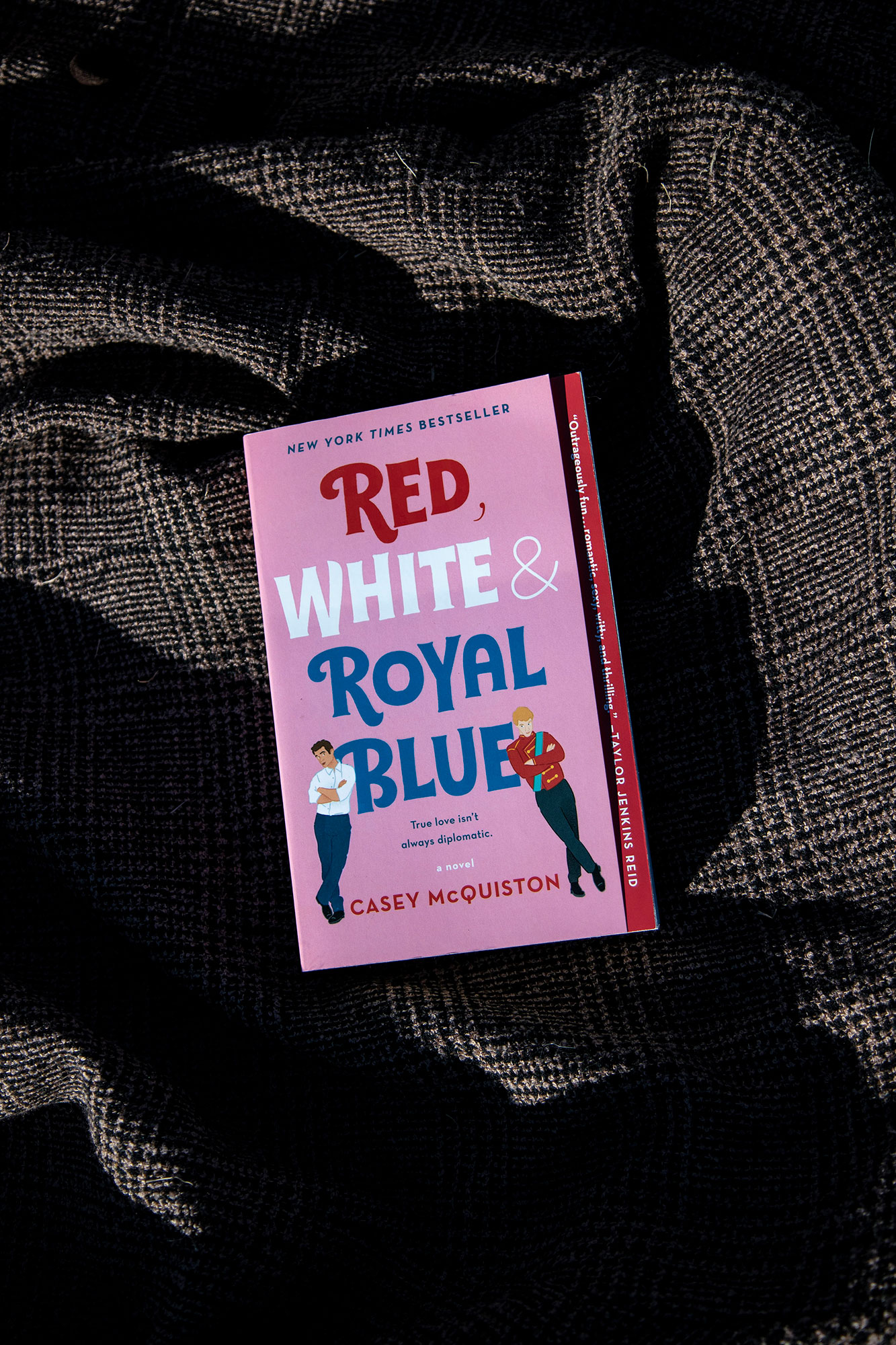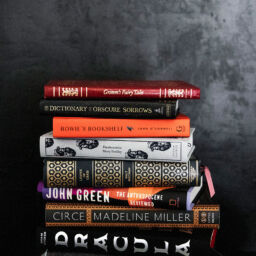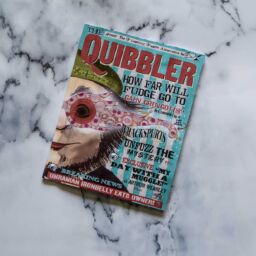These TikTok kids know what they’re talking about: first they found The Song of Achilles and now Red, White & Royal Blue by Casey McQuiston is all the rage. Now, I don’t have a TikTok, but a friend, the same friend who recommended Circe to me, heard about the book on the app, and while strolling around a bookstore with me, picked it up and said, “This is gay. You’d like it.”
You’d be surprised to know that it’s basically that easy to sell me on a book. Later that evening I went on my reading app and found Red, White & Royal Blue; I started to read the reviews, the first three being long, heartfelt testimonials calling the novel “seriously the best book I have ever read” and exclaiming that it “made me fall in love with reading again.” Still, I wasn’t sold until the fourth review written by a person named Miriam. All Miriam wrote was “good smut” and gave it five stars. Well, Miriam, you sold me, I immediately purchased the book after your evaluation.
Red, White & Royal Blue is intended for escapism. The story takes place in a universe parallel to our own, in 2019 from the perspective of Alex Claremont-Diaz, the First Son of the United States. Although Alex is twenty-one, he still lives in the White House with his older sister June to support their mother throughout her Presidency. The story starts off establishing an idyllic mirror of our own world, the introductory characters are diverse, witty and endlessly endearing, and the narrative surrounding America electing a liberal woman from Texas, who is a person of color as our country’s leader enthralled me and set an extremely beautiful, tolerant tone.
It’s established early that Alex has a small rivalry with a Prince of England named Henry. While the two men are regularly compared in the media, Alex find’s Henry to be boring, cookie cutter and overall “too Prince Charming-like.” The situation goes awry when Alex and Henry get into an altercation at a Royal Wedding, resulting in their handlers forcing them to fake a close friendship to keep international relations in order. Anyone with two brain cells can safely assume, that, of course, through their efforts of feigning friendship, it seems only natural that Alex and Henry fall in love.

Overall, the book was just lovely. It’s exactly what one returns to when in need of comfort, but what will allow this book to stand the test of time is that it is inclusive and progressive.
“Enemies to lovers” and “fake relationships” are extremely common tropes within young adult novels and endless fanfictions, but with Red, White and Royal Blue there is an added freshness to the tale. The most refreshing aspect being that there is very little shame in regard to “the gay details,” which is no small feat for a published, mainstream work of fiction. McQuinston doesn’t hold back, she encompasses the story of two boys falling in love with nuance and integrity.
Obviously, Alex and Henry’s situation is tricky given that these two young men are in (moderate) positions of power, and the British Monarchy isn’t exactly known for their tolerance. What’s so vibrant within the story is the boy’s individual levels of introspection. They are so tolerant of their queer desires and behaviors and as Miriam said, it makes for good smut. The sex scenes are steamy and fun, and the author doesn’t shy away from the fact that the sex is queer sex, which, as a queer reader, is so gratifying. Remarkably, the romance brewing between the boys is even more enjoyable to read than the sex. Alex and Henry write eloquent, unfeigned love letters to each other, albeit in email format, but their growing fondness and ongoing correspondence emulated some of the great works from the Romantic period. Through this correspondence, McQuinston writes these characters in such distinct voice that the prose completely envelops you. I am in love with both Henry and Alex. And June. And several other supporting characters which is just astonishing.
A taste of the language given in a letter to Alex from Henry in chapter nine: “I’m ruminating on identity and your question about where a person like me comes from, and as best as I can explain it, here’s a story. Once, there was a young prince who was born in a castle. His mother was a princess scholar, and his father was the most handsome, feared knight in all the land. As a boy, people would bring him everything he could ever dream of wanting. The most beautiful silk clothes, ripe fruit form the orangery. At times, he was so happy, he felt he would never grow tired of being a prince. He came from a long, long line of princes, but never before had there been a prince quite like him; born with his heart on the outside of his body. When he was small, his family would smile and laugh and say he would grow out of it one day. But as he grew, it stayed where it was, red and visible and alive. He didn’t mind it very much, but every day, the family’s fear grew that the people of the kingdom would soon notice and turn their backs on the prince. His grandmother, the queen, lived in a high tower, where she spoke only of the other princes, past and present, who were born whole. Then, the prince’s father, the knight, was struck down in battle. The lance tore open his armor and his body and left him bleeding in the dust. And so, when the queen sent new clothes, armor for the prince to parcel his heart away safe, the prince’s mother did not stop her. For she was afraid, now: afraid of her son’s heart torn open too. So, the prince wore it, and for many years believed it was right. Until he met the most devastatingly gorgeous peasant boy from a nearby village who said absolutely ghastly things to him that made him feel alive for the first time in years who turned out to be the most mad sort of sorcerer, one who could conjure up things like gold and vodka shots and apricot tarts out of absolutely nothing, and the prince’s whole life went up in a puff of dazzling purple smoke, and the kingdom said, ‘I can’t believe we’re all so surprised.’”
Overall, the book was just lovely. It’s exactly what one returns to when in need of comfort, but what will allow this book to stand the test of time is that it is inclusive and progressive. I, like so many other people, have found myself returning to books that I know have so many problematic elements to them, such as Little Women or Jane Eyre. This book left me with no murky feelings, there is no hinderance that is “the times” within. It’s honest in its portrayal of a queer couple in the 21st century in that yes, there is shame and second guessing, but love wins in the end. RW&RB is so vivacious: I was struck with the actuality that both of these men are extremely likeable, a theme exceedingly rare in romantic fiction, and basically nonexistent in queer fiction. The Song of Achilles is a great example – while the story is the “progressive approach” to The Iliad, Achilles and Patroclus are both murderers and commit several atrocities throughout the story. While that story takes place in “a different time,” I am very glad that the narrative around queer relationships is evolving into something much more hopeful: a beautiful story about two agreeable men falling in love. Neither of them dies, hurt anyone, or end up married to a woman in the end. It’s exceeded my expectations by committing to the bare minimum.









Informative article, totally what I wanted to find.